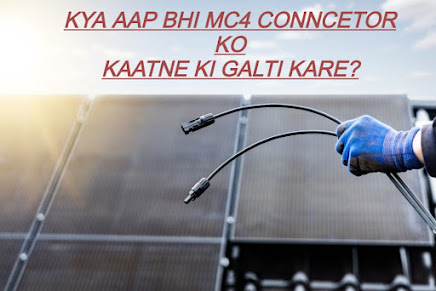The MC4 connector is a type of electrical connector commonly used in the photovoltaic (PV) or solar industry to connect solar panels and other components in a solar power system. MC4 stands for "Multi-Contact 4," and it's a brand name for this specific type of connector.
MC4 connectors are designed for use in outdoor and high-voltage applications, making them ideal for solar installations. They are known for their robust and reliable connection, even in harsh environmental conditions. MC4 connectors come in both male and female configurations, and they are used to make secure electrical connections between solar panels, inverters, and other components of a solar power system.
Some key features of MC4 connectors include:
Weather Resistance: MC4 connectors are designed to withstand exposure to sunlight, rain, and other environmental factors commonly encountered in outdoor solar installations.
Easy Installation: They are easy to install and typically feature a "snap-in" mechanism that securely locks the connectors together.
High Voltage and Current Capacity: MC4 connectors are designed to handle the high voltages and currents generated by solar panels and are rated for the typical voltage levels found in solar systems.
Safety: MC4 connectors are designed to be safe and prevent accidental disconnection.
Compatibility: They are a widely accepted industry standard, making it easy to find compatible components from different manufacturers.
When installing a solar panel system, it's important to follow the manufacturer's instructions for connecting MC4 connectors to ensure a safe and reliable electrical connection. Additionally, proper safety precautions should be taken when working with solar panels and electrical components.
If you disconnect an MC4 connector from a solar module, several things can happen:
Electrical Disconnection: The MC4 connector is used to connect the solar module to other components in a solar PV system, such as inverters, charge controllers, or other modules. Disconnecting the MC4 connector will electrically isolate the module from the rest of the system. This means that the electrical output of the module will no longer be fed into the system, and the module will stop generating electricity.
Interruption of Power Generation: Disconnecting the MC4 connector will interrupt the power generation of the solar module. This can be necessary for maintenance, troubleshooting, or if you need to remove the module from the system.
Safety Precaution: Disconnecting the MC4 connector is a safety precaution. If you need to perform maintenance or work on the solar module, it's essential to disconnect it from the rest of the system to prevent electrical shock or damage.
Voltage and Current Safety: Solar modules generate electricity when exposed to sunlight, and the electrical output can be at a high voltage and current, depending on the configuration of the system. Disconnecting the MC4 connector ensures that no electricity flows through the wires, making it safe to handle the module.
When disconnecting an MC4 connector, it's crucial to follow safety guidelines and manufacturer's instructions to avoid accidents or damage to the solar module and the system. Additionally, it's essential to ensure that the solar module is not generating electricity or exposed to direct sunlight when disconnecting the MC4 connector to avoid electrical hazards.
Cutting an MC4 connector from a solar panel may void the warranty of the panel, and it is generally not recommended unless it is explicitly allowed by the manufacturer's warranty terms. Warranties for solar panels typically cover manufacturing defects and certain types of damage that occur under normal operating conditions. If you modify or tamper with the panel, such as cutting off the MC4 connector, it may be considered misuse or damage caused by user error, and the manufacturer may refuse to honor the warranty.
Before making any modifications to your solar panel, it's essential to review the warranty documentation provided by the panel manufacturer or contact their customer support to inquire about the specific terms and conditions of your warranty. Some manufacturers might allow limited modifications or provide guidelines for handling connectors and cables, while others may have stricter policies.
In general, it's best to consult with the manufacturer or a professional solar installer before making any modifications to your solar panel system to ensure you don't inadvertently void your warranty or compromise the safety and performance of your installation.









1 टिप्पणियाँ
Good article
जवाब देंहटाएं